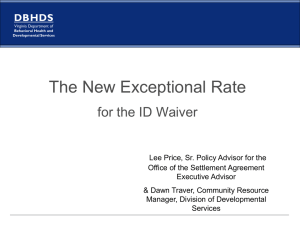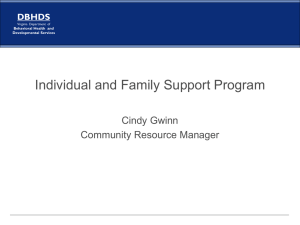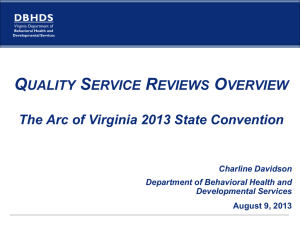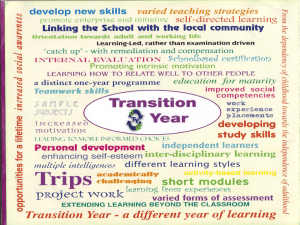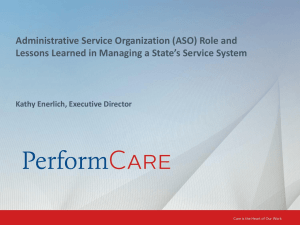D B H D S - vaACCSES.org
advertisement
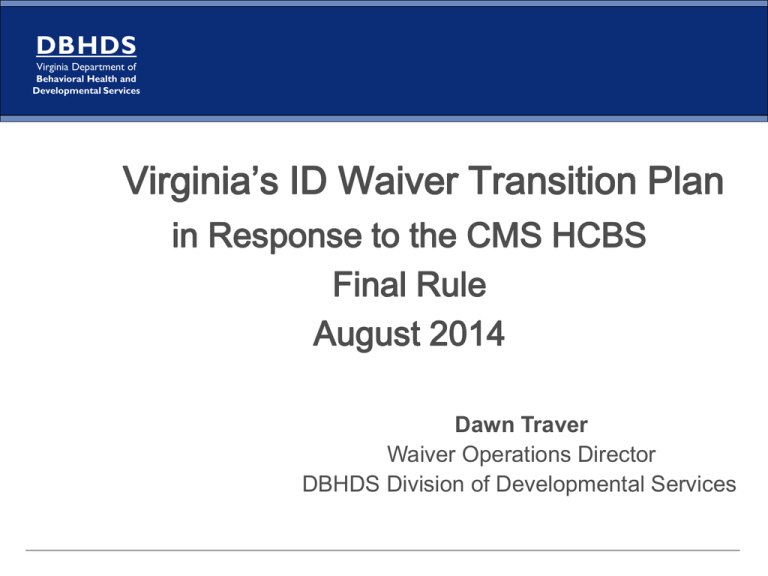
DBHDS Virginia Department of Behavioral Health and Developmental Services Virginia’s ID Waiver Transition Plan in Response to the CMS HCBS Final Rule August 2014 Dawn Traver Waiver Operations Director DBHDS Division of Developmental Services DBHDS Virginia Department of Behavioral Health and Developmental Services Final Rule CMS 2249-F and CMS 2296-F Published in the Federal Register on January 16, 2014. Text and further CMS guidance is available at: http://www.medicaid.gov/HCBS Page 2 DBHDS Virginia Department of Behavioral Health and Developmental Services Intent of the Final Rule • To ensure that individuals receiving long-term services and supports through home and community based service (HCBS) programs . . . have full access to benefits of community living and the opportunity to receive services in the most integrated setting appropriate • To enhance the quality of HCBS and provide protections to participants Page 3 DBHDS Virginia Department of Behavioral Health and Developmental Services Highlights of the Final Rule • Defines, describes, and aligns home and community-based setting requirements • Defines person-centered planning requirements for persons in HCBS settings • Provides CMS with additional compliance options for waiver programs Page 4 DBHDS Virginia Department of Behavioral Health and Developmental Services Home & Community-Based Setting Requirements • Establish an outcome-oriented definition that focuses on the nature and quality of individuals’ experiences • Maximize opportunities for individuals to have access to the benefits of community living and the opportunity to receive services in the most integrated setting Page 5 DBHDS Virginia Department of Behavioral Health and Developmental Services HCB Settings Requirements • Be integrated in and support access to the greater community • Provide opportunities to seek employment and work in competitive integrated settings, engage in community life, and control personal resources • Ensure the individual receives services in the community to the same degree of access as individuals not receiving Medicaid home and community-based services Page 6 DBHDS Virginia Department of Behavioral Health and Developmental Services HCBS Requirements • Is selected by the individual from among setting options, including – non-disability specific settings – an option for a private unit in a residential setting • Person-centered service plans document the options based on the individual’s needs, preferences; and for residential settings, the individual’s resources Page 7 DBHDS Virginia Department of Behavioral Health and Developmental Services HCBS Requirements (cont’d) • Ensures an individual’s rights of privacy, dignity, respect, and freedom from coercion and restraint • Optimizes individual initiative, autonomy, and independence in making life choices • Facilitates individual choice regarding services & supports and who provides them Page 8 DBHDS Virginia Department of Behavioral Health and Developmental Services HCBS Requirements for Provider-Owned or Controlled Residential Settings • Specific unit/dwelling is owned, rented, or occupied under legally enforceable agreement • Same responsibilities/protections from eviction as all tenants under landlord tenant law of state, county, city or other designated entity • If tenant laws do not apply, state ensures lease, residency agreement or other written agreement is in place providing protections to address eviction processes and appeals comparable to those provided under the jurisdiction’s landlord tenant law Page 9 DBHDS Virginia Department of Behavioral Health and Developmental Services HCBS Requirements for Provider-Owned or Controlled Residential Settings (cont’d) • Each individual has privacy in their sleeping or living unit • Units have lockable entrance doors, with the individual and appropriate staff having keys to doors as needed • Individuals sharing units have a choice of roommates • Individuals have the freedom to furnish and decorate their sleeping or living units within the lease or other agreement Page 10 DBHDS Virginia Department of Behavioral Health and Developmental Services HCBS Requirements for Provider-Owned or Controlled Residential Settings (cont’d) • Individuals have freedom and support to control their schedules and activities and have access to food any time • Individuals may have visitors at any time • Setting is physically accessible to the individual Page 11 DBHDS Virginia Department of Behavioral Health and Developmental Services HCBS Requirements for Provider-Owned or Controlled Residential Settings (cont’d) • Modifications to the additional requirements must be: – Supported by specific assessed need – Justified in the person-centered service plan – Documented in the person-centered service plan Page 12 DBHDS Virginia Department of Behavioral Health and Developmental Services HCBS Requirements for Provider-Owned or Controlled Residential Settings (cont’d) • Documentation in the PCP of modifications to the additional requirements includes: – Specific individualized assessed need – Prior interventions and supports including less intrusive methods – Description of condition proportionate to assessed need – Ongoing data measuring effectiveness of modification – Established time limits for periodic review of modifications – Individual’s informed consent – Assurance that interventions and supports will not cause harm Page 13 DBHDS Virginia Department of Behavioral Health and Developmental Services Settings that are NOT HCB • Nursing facility • Institution for mental diseases (IMD) • Intermediate care facility for individuals with intellectual disabilities (ICF/IID) • Hospital Page 14 DBHDS Virginia Department of Behavioral Health and Developmental Services Settings Presumed Not to Be HCB • Settings in a publicly or privately-owned facility providing inpatient treatment • Settings on grounds of, or adjacent to, a public institution • Settings with the effect of isolating individuals from the broader community of individuals not receiving Medicaid HCBS Page 15 DBHDS Virginia Department of Behavioral Health and Developmental Services Settings that Have the Effect of Isolating Individuals • Settings that might, but will not necessarily, meet the criteria for isolating – The setting is designed specifically for people with disabilities, and often even for people with a certain type of disability. – The individuals in the setting are primarily or exclusively people with disabilities and on-site staff provides many services to them. Page 16 DBHDS Virginia Department of Behavioral Health and Developmental Services Settings that Have the Effect of Isolating Individuals (cont’d) • May have any of the following characteristics: – Designed to provide people with disabilities multiple types of services and activities on-site, including housing, day services, medical, behavioral and therapeutic services, and/or social and recreational activities – People in the setting have limited, if any, interaction with the broader community – Uses/authorizes interventions/restrictions that are used in institutional settings or are deemed unacceptable in Medicaid institutional settings (e.g., seclusion) Page 17 DBHDS Virginia Department of Behavioral Health and Developmental Services Settings that Have the Effect of Isolating Individuals (cont’d) • Examples of settings that isolate: – Farmstead or disability-specific farm community – Gate/secured “community” for people with disabilities – Residential schools – Multiple settings co-located and operationally related (i.e., numerous group homes co-located on a single site or multiple units on the same street) Page 18 DBHDS Virginia Department of Behavioral Health and Developmental Services Required Transition Plan • For renewals and amendments to existing HCBS 1915(c) waivers submitted within one year of the effective date of final rule: – The state submits a plan in the renewal or amendment request detailing any actions necessary to achieve or document compliance with setting requirements for the specific waiver or amendment – Renewal or amendment approval will be contingent upon inclusion of an approved transition plan Page 19 DBHDS Virginia Department of Behavioral Health and Developmental Services Virginia’s DRAFT ID Waiver Transition Plan • The full text is available at: http://www.dbhds.virginia.gov/ODS-default.htm Page 20 DBHDS Virginia Department of Behavioral Health and Developmental Services Elements of VA’s ID Waiver Transition Plan •DBHDS to review and propose changes to its Licensing regulations •Additions/changes regarding: –settings expectations, particularly providerowned or controlled residential settings –person-centered planning provisions of the Final Rule Page 21 DBHDS Virginia Department of Behavioral Health and Developmental Services Elements of VA’s ID Waiver Transition Plan (cont’d) Timeline for DBHDS Licensing Regulations Revisions Internal review: Identify Office of Licensing (OL) review team 8/1/14 – 8/15/14 OL review and recommendations for changes 8/18/14 – 10/17/14 Identify DBHDS review team 10/6/14 – 10/17/14 DBHDS review and recommendations for changes Stakeholder review: 10/20/14 – 1/30/15 Identify work group members 1/5/15 – 1/23/15 Review and recommendations for changes 2/2/15 – 7/31/15 DBHDS final revisions and approval 8/3/15 – 9/30/15 Review by Office of Attorney General 10/1/15 – 2/29/16 Submission for Virginia Standard Regulatory Review & Approval process Promulgation and training of providers 3/1/16 – 2/28/17 Total Time 3/1/17 – 9/1/17 Approx. 36 months Page 22 DBHDS Virginia Department of Behavioral Health and Developmental Services Elements of VA’s ID Waiver Transition Plan (cont’d) By 10/01/14: • DBHDS to distribute a self-assessment tool to providers affected by the settings rule to help each determine: – Areas in which their setting meets Final Rule settings provisions – Areas in which their setting requires improvements • Participation is mandatory Page 23 DBHDS Virginia Department of Behavioral Health and Developmental Services Elements of VA’s ID Waiver Transition Plan (cont’d) January 2015: •Providers give feedback to DBHDS/DMAS regarding their self-assessment results via Survey Monkey –Provider believes licensed site meets the intent of the rule –Adjustments will be required in order to comply –TA from DBHDS is needed –Date provider will be in full compliance (no later than 03/2019) –Provider plans to stop providing waiver services by 03/2019 Page 24 DBHDS Virginia Department of Behavioral Health and Developmental Services Elements of VA’s ID Waiver Transition Plan (cont’d) Early 2016: •DBHDS Office of Licensing staff visit each provider entity to assure Final Rule compliance using same checklist –Those not in full compliance, given 24 mos. to comply •DBHDS CRCs available to provide consultation to those struggling with implementation –DMAS QMR/PI notified of those substantially lacking compliance Page 25 DBHDS Virginia Department of Behavioral Health and Developmental Services Elements of VA’s ID Waiver Transition Plan (cont’d) December 2018: • Those not in compliance notified that they will forfeit waiver provider status by 03/2019 • Support coordinators/case managers for individuals receiving supports in those settings will work to provide choice of providers to those persons should they wish to continue to receive waiver services. Page 26 DBHDS Virginia Department of Behavioral Health and Developmental Services VA’s ID Waiver Response to PCP Elements of the Final Rule • The ID Waiver is already in compliance with most of the PCP requirements. • A multi-agency committee met earlier this year to make some changes to the PCP ISP which will make it even more compliant. Page 27 DBHDS Virginia Department of Behavioral Health and Developmental Services VA’s ID Waiver Response to PCP Elements of the Final Rule (cont’d) • Additional elements to be introduced over the next 12 months to ensure full PCP compliance: – A copy of the ISP must be provided to the individual and his/her representative. – The ISP should exclude unnecessary or inappropriate services and supports. – The ISP reflects that the setting is chosen by the individual and is integrated in, and supports full access to the greater community. Page 28 DBHDS Virginia Department of Behavioral Health and Developmental Services VA’s ID Waiver Response to PCP Elements of the Final Rule (cont’d) • Additional elements (cont’d): – The ISP and ongoing documentation reflects individual’s opportunity • to engage in community life, • control personal resources, and • receive services in the community to the same degree of access as individuals not receiving Medicaid HCBS. Page 29 DBHDS Virginia Department of Behavioral Health and Developmental Services VA’s ID Waiver Response to PCP Elements of the Final Rule (cont’d) • Additional elements (cont’d): – The PCP ISP documents any safety needs warranted restriction is supported by a specific assessed need and is appropriately justified. • There must be a plan to review continued need for restriction and to provide services to allow the person to no longer need the restriction. Page 30 DBHDS Virginia Department of Behavioral Health and Developmental Services VA’s ID Waiver Response to PCP Elements of the Final Rule (cont’d) • Additional elements (cont’d): – Expectations will be clarified regarding the definition and implementation of informed choice and consent processes. – An enhanced focus on achieving the desired outcomes the individual has chosen • Verifiable means of documenting that chosen outcomes are being accomplished in the proposed time frames • Must be a process in place for individuals to revisit their outcome choices, inclusive of who is providing supports and services. Page 31 DBHDS Virginia Department of Behavioral Health and Developmental Services Final Elements of VA’s ID Waiver Transition Plan • Update for CMS on VA’s current status of: – Assessment of quality management practices – Assessment of information systems – Guidance and training for providers regarding Final Rule implementation • DBHDS staff (OL, OHR, CRCs, CIMs), CSB support coordinators, and DMAS staff (QMR) will use site visits and other forums to educate providers regarding Final Rule components, completion of the self-assessment tool, and suggestion ways to remedy deficiencies. Page 32 DBHDS Virginia Department of Behavioral Health and Developmental Services Public Comment • CMS requires at least a 30 day public comment period for the state’s Transition Plan • Virginia is collecting comments through this and two additional webinars (8/26 AM & PM) and written comments through MyLifeMyCommunity@dbhds.virginia.gov Through September 6th Page 33 DBHDS Virginia Department of Behavioral Health and Developmental Services Time for Your Comments Page 34
